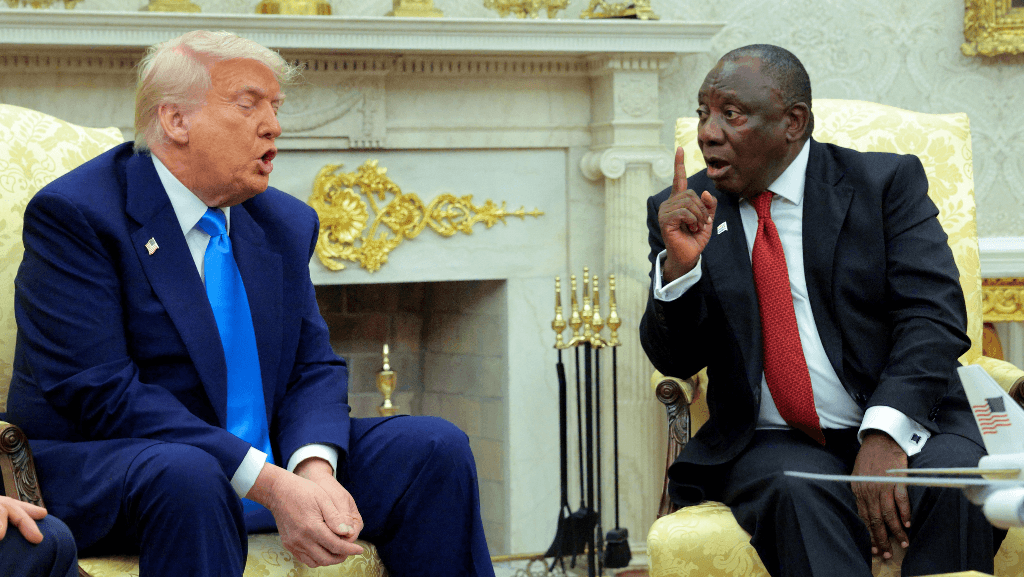
Trump Confronts South Africa's Ramaphosa Over Land Expropriation Law
In a tense Oval Office exchange, President Donald Trump challenges South African President Cyril Ramaphosa over the Expropriation Act of 2024, citing discredited claims of white genocide.
Diplomatic Tensions Emerge Over Land Reform
A routine diplomatic engagement took a dramatic turn when President Trump confronted President Ramaphosa with materials alleging targeted violence against white South African farmers.
Trump argued that South Africa's recently passed Expropriation Act of 2024 facilitated the forced seizure of land, framing it as evidence of state-sanctioned racial persecution.
The confrontation, which included video clips and news reports, was met with concern by South African officials and international observers. Ramaphosa, according to sources present at the meeting, pushed back firmly, calling the allegations misleading and harmful to international diplomatic discourse.
Understanding the Expropriation Act of 2024
The Expropriation Act, passed in early 2024, empowers the South African government to acquire private land for public interest or use, including the possibility of nil compensation in specific cases such as abandoned or state-owned land.
Key provisions of the law:
-
Land can only be expropriated where it is “just and equitable.”
-
The law complies with Section 25 of South Africa’s Constitution, which mandates fair procedures and outcomes in land reform.
-
It is part of broader efforts to correct apartheid-era land ownership disparities, where 72% of farmland is still white-owned despite Black South Africans making up 80% of the population.
Despite assurances from South Africa’s Constitutional Court and legal community, the law has become a flashpoint internationally due to misconceptions about its intent and execution.
Trump’s Use of the ‘White Genocide’ Narrative
President Trump has echoed far-right talking points by labelling South Africa’s policy as a form of “white genocide.” However, this claim has been widely refuted.
According to South African Police Service data, there were 266 farm attacks in 2024, with fewer than 50 resulting in fatalities. These incidents affected both white and Black farmers, with no statistical evidence pointing to a racially motivated genocide.
The U.S. State Department, under previous administrations, has consistently found “no evidence of systemic violence against any racial group” in South African land reform processes.
Ramaphosa’s Firm Response
Ramaphosa reiterated that the Expropriation Act is a democratic tool to address structural inequality, not an attack on white South Africans.
“We reject the notion that our land reform policy is an assault on any racial group,” Ramaphosa stated, emphasising that the Act’s core purpose is to restore dignity and balance to a historically unequal land economy.
He also noted that crime affects all demographics, citing that over 80% of South Africa’s murder victims are Black, contradicting the narrative presented by Trump.
Geopolitical and Legal Ramifications
Trump’s remarks could have ripple effects on U.S.–Africa relations, especially in light of ongoing investment and development agreements. Legal scholars and policymakers alike have criticised the politicisation of complex domestic policies abroad, warning it sets a troubling precedent.
Furthermore, the portrayal of land reform as racially motivated threatens to delegitimise the legal frameworks underpinning reform policies not just in South Africa but in other post-colonial nations engaged in similar efforts.
Key Takeaways
-
Donald Trump accused South Africa of "white genocide" during a meeting with Cyril Ramaphosa, citing the Expropriation Act of 2024.
-
The Expropriation Act allows for land acquisition under specific legal conditions, in line with South Africa’s Constitution.
-
Claims of race-targeted violence against white farmers are unsupported by official crime statistics and legal analysis.
-
The Oval Office exchange may impact U.S. foreign policy credibility and South Africa’s image on the global stage.